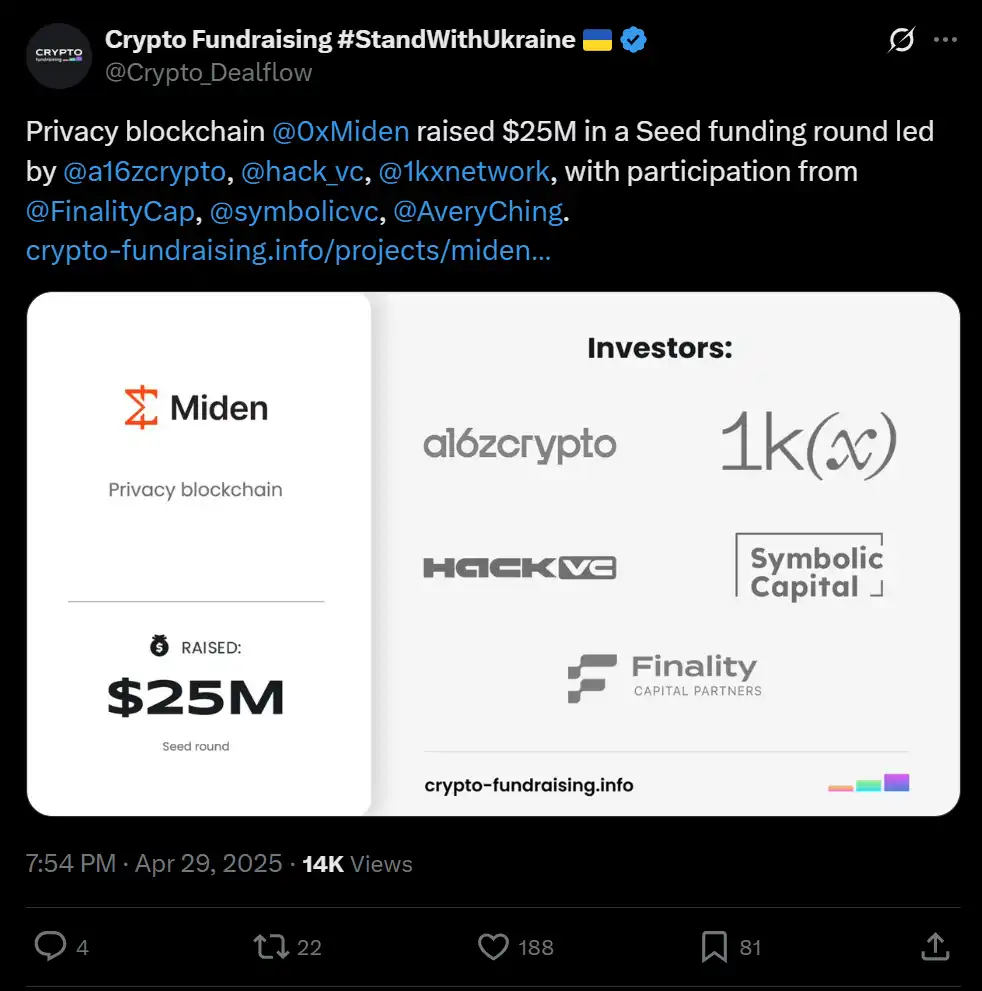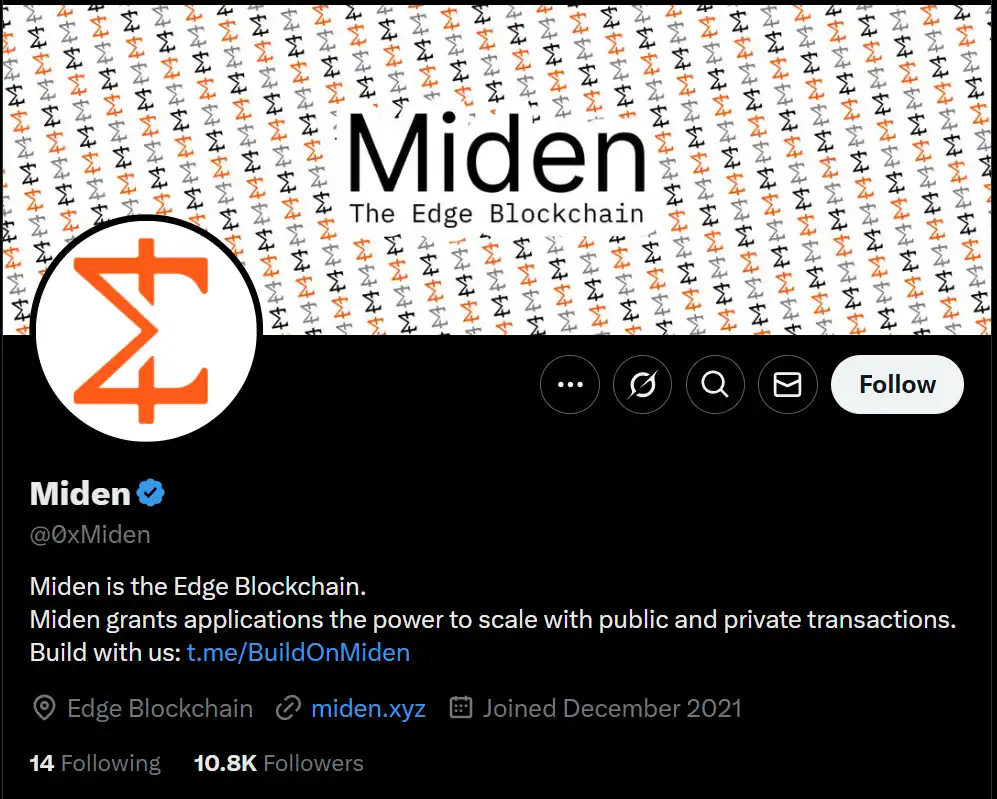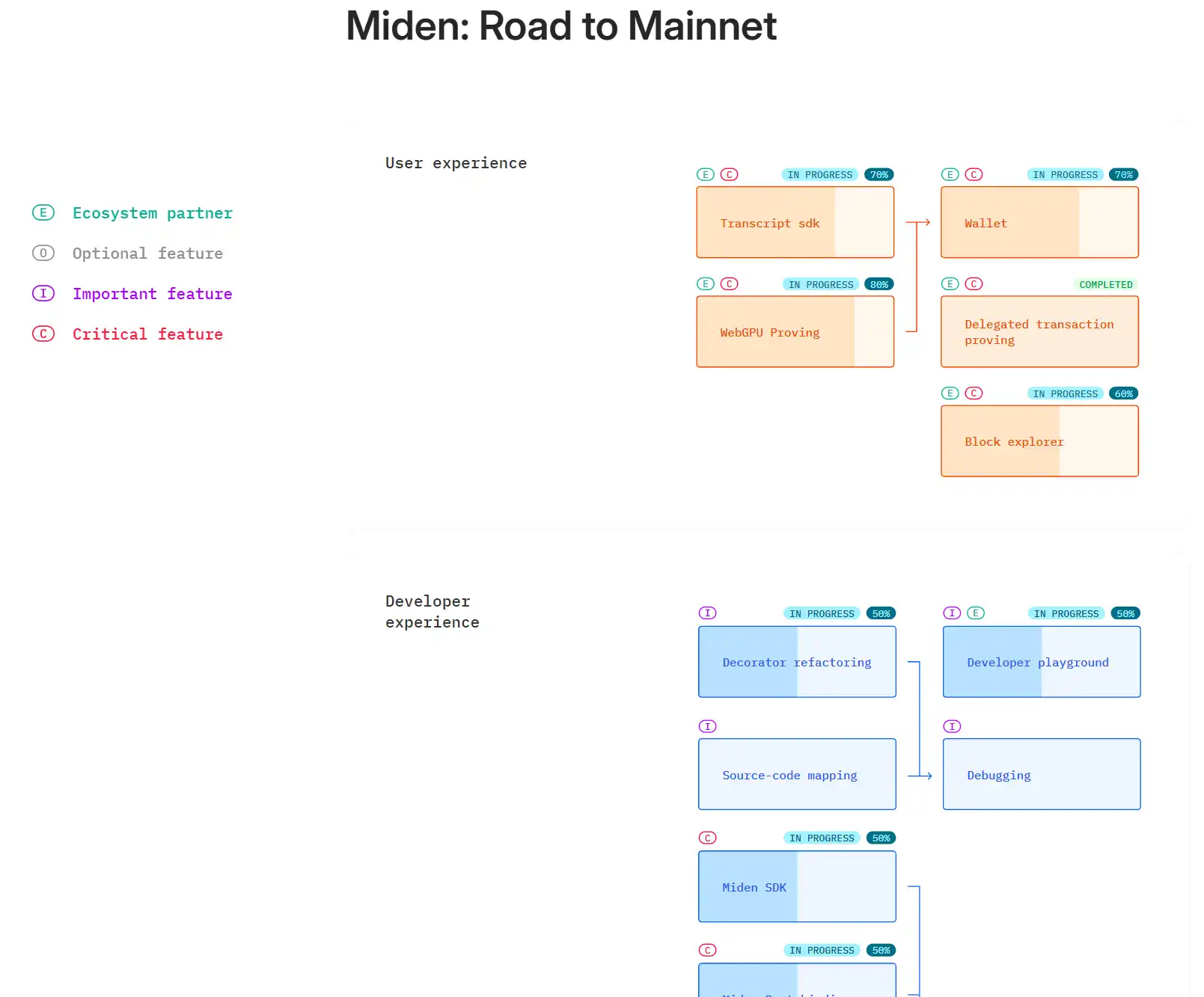最近的大盘横着走,热点不多,散户情绪也谈不上亢奋。但越是在这种「看不出方向」的时候,聪明的钱往往已经悄悄动了起来。尤其是在那些被反复讲过、甚至一度被认为「炒不动」的老叙事中。
今年 4 月 29 日,隐私区块链 0xMiden 官宣拿下 2500 万种子轮融资,由 a16zcrypto、hackVC、1kxnetwork 领投,Finality Capital Partners、Symbolic Capital 等参投,个人投资者包括 Avery Ching(Aptos Labs CEO)和 Rune Christensen(MakerDAO 创始人)。
0xMiden 主打的是「边缘区块链」的概念,目标是让应用在处理交易时,既可以选择公开透明的路径,也能一键切换到隐私模式,在不牺牲扩展性的前提下实现隐私保护,项目背后是加密投融资数据平台 CryptoRank 的孵化支持。

看到它在 ZK 和隐私叙事里被大佬围着投,我有点好奇:这个项目到底踩中了哪个关键点,让资本一拥而上?0xMiden 它和 Aztec、Zcash 这些早就做隐私的项目又到底有什么不一样?
要搞清楚这个问题,我们得先理解一件事:现在的区块链,其实非常「不隐私」,但如果你一味追求隐私,又会把可扩展性和合规性全牺牲掉。
所以隐私链这个方向,过去几年虽然一直有声音,但始终没跑出来一个「能用、可扩、还不被监管一刀切」的解法。
现在,0xMiden 试图换一个视角重启这个难题。
一条不联网也能跑的隐私链
0xMiden 自称是个「边缘区块链」(edge blockchain),听起来有点像边缘计算那套,其实核心意思是:智能合约不再都丢给链来算,而是用户在自己的设备上本地执行,算完了打包成一个 ZK 证明,再广播到链上验证。

换句话说,每台设备都像一个「小型区块链节点」,自己计算、自己证明,只把结果告诉链,让链帮你验证。这种模式下,链的角色不再是「苦力」,而更像一个「裁判」,你说你算对了,那你得拿出能验证的证明来。
这个模式有几个核心变化,所有执行都本地完成,执行都在本地完成,链的负担非常小,扩展性自然强。生成的 ZK 证明是轻量级的,不像 zkRollup 那种超级重的批量证明,适合终端设备自己搞定。默认是隐私的,但开发者可以选择哪些计算公开,哪些保密,灵活切换,适配不同场景。
说到底,它想造的不是一个大而全的 Layer1,而是一种链和设备之间的新交互方式,像随身钱包一样随身跑智能合约。
这和现在市面上大热的隐私链有些明显区别,比如 Aztec 主打「ZK-rollup+加密 EVM」,依旧是把所有用户交易 rollup 到一起处理,排序器也很中心化,本质上还是 Layer2 思路。Fhenix 用的是 TEE + 同态加密,更偏向硬件信任 + 加密存储,ZK 并不是主角。
0xMiden,则是从底层逻辑上走了一条「ZK-first + 本地计算」的路线,强调灵活、轻量、终端友好。

简单讲,0xMiden 的执行是「去中心化」的,甚至可以离线执行、离线生成证明,再统一上传结果。你的手机、浏览器、AI 芯片,未来都可能变成跑智能合约的小节点,ZK 帮你保证计算正确,链只管验结果。
为什么大佬们愿意砸钱?
早在 2021 年,a16z 就投资了 0xMiden 创始人 Bobbin Threadbare 的早期项目,当时项目尚属 Polygon Miden 的一部分。此次 2025 年 4 月 29 日的 2500 万美元种子轮融资 a16z 的再次参与,凸显其对 Bobbin 团队的长期信心。
团队方面,0xMiden 由 Bobbin Threadbare、Dominik Schmid 和 Azeem Khan 创立,三人都曾服务于 Meta 的区块链团队,具备深厚的零知识证明和区块链开发经验。
0xMiden 最初是在 Polygon Labs 下开发的项目,并于 2025 年 3 月 31 日分拆为独立实体,此次融资被视为「团队重组+独立融资」。分拆后,0xMiden 专注以太坊 zk-Rollup 隐私解决方案,CryptoRank 作为孵化方,提供资金和资源支持,但技术开发主要由团队独立完成。
0xMiden 是继 Avail 和 Privado ID 之后从 Polygon 分拆出来的第三个项目。Polygon Labs 联合创始人 Sandeep Nailwal 在一份声明中说:「它计划将其原生代币的约 10% 空投给 POL 持有者和质押者,直接奖励帮助其发展的生态系统。」
从投资角度看,0xMiden 的吸引力在于它的 ZK 本地计算模式,这代表着 ZK 的未来趋势。与传统的 Rollup 不同,它不是链的替代品,而是作为隐私插件补充开发,提供灵活的隐私选项。
项目状况
同时,Miden 已经上线了实用的开发工具,开发者能开始编写真实的智能合约,远离那些仅停留在概念阶段的项目。更重要的是,它的设计支持「默认隐私、可选择公开」,在合规上也有一定空间。
目前主网还没上线,但 VM 和 SDK 已经在 Github 开源。他们给的 roadmap 是这样的:
·Miden VM 开源(已完成)
·开发者工具包 SDK 发布(已完成)
·测试网上线(预计 2024 年 Q3)
·主网上线(最早可能在 2025 年初)

现在已经有部分开发者在用 Miden VM 写 demo 合约,比如本地投票、设备日志校验、游戏内资产操作等场景。但要真正「破圈」,可能还要等一个像「本地版 Friend.tech」或「AI 模型运行市场」这样的「杀手级」应用场景。
隐私区块链,为啥又火了?
这个叙事不是新的,但最近确实又有点回温,核心原因是三个。
首先,监管压力在持续上升。全球范围内,对加密身份和资产流动的监管正变得越来越严格,无论是链上 KYC、钱包黑名单,还是交易所合规化,都在不断压缩「绝对匿名」的生存空间。反而是面向机构、合规友好、可控范围内的隐私需求正在升温,尤其是在企业级场景中,选择性隐私成了刚需。
其次是 ZK 技术终于「落地可用」了。过去几年,ZK 一直停留在「技术炫技」的阶段,又贵又慢、开发难度大。但随着 STARK、SNARK 等技术的成熟,证明生成和验证成本持续下降,让 ZK 从「理论上的未来」变成了「可以实打实跑起来的现实」。
第三,AI 区块链应用的兴起,越来越多的 AI 计算、数据上链、边缘推理等场景落地,原本局限于交易隐私的需求开始向「数据隐私」、「模型隐私」扩展。
这类应用对隐私的要求不再是「全链黑箱」,而是「本地计算 + 选择性加密」,也就是所谓的局部隐私。
而老牌隐私项目,如 Monero、Zcash,一方面只支持简单交易,另一方面被监管紧盯,主打「绝对匿名」的路线已经越来越难走。
所以,新的机会来了,不是搞绝对黑箱,而是搞「本地计算+选择性隐私」。
这轮隐私叙事,会不会从「本地开始」?
隐私链这个方向,不会短期爆发,但一直缺一个真正能跑的方案。
Aztec、Fhenix 们还在搞「链上隐私」,而 0xMiden 想把这个叙事带到「链下」设备端、自主运行、选择性上链。
这个角度其实是 ZK 的下一个自然演化方向,也符合「AI+链」、「数据主权」等未来趋势。如果这个故事能讲通、产品真能落地,那 0xMiden 可能会成为下一个值得关注的「隐私计算基础设施」。
当然,前提是,它真能撑到主网上线的那一天。
免责声明:本文章仅代表作者个人观点,不代表本平台的立场和观点。本文章仅供信息分享,不构成对任何人的任何投资建议。用户与作者之间的任何争议,与本平台无关。如网页中刊载的文章或图片涉及侵权,请提供相关的权利证明和身份证明发送邮件到support@aicoin.com,本平台相关工作人员将会进行核查。




